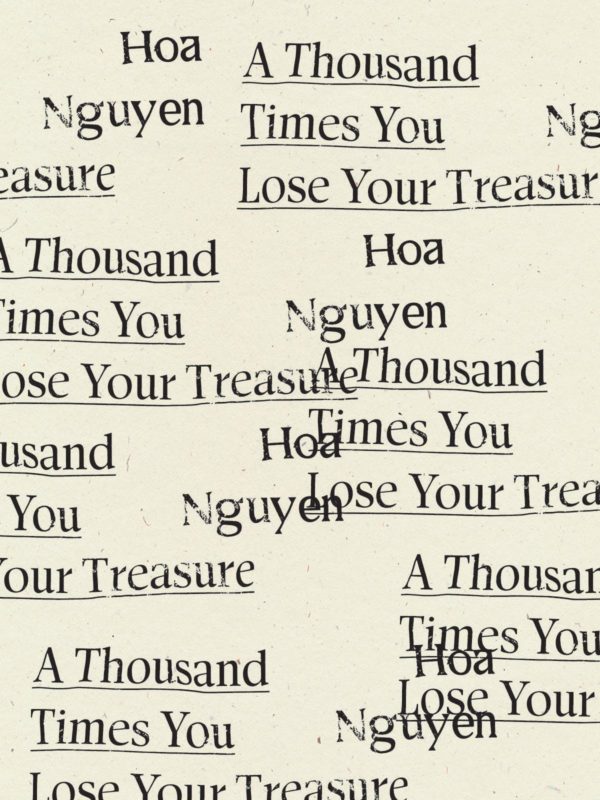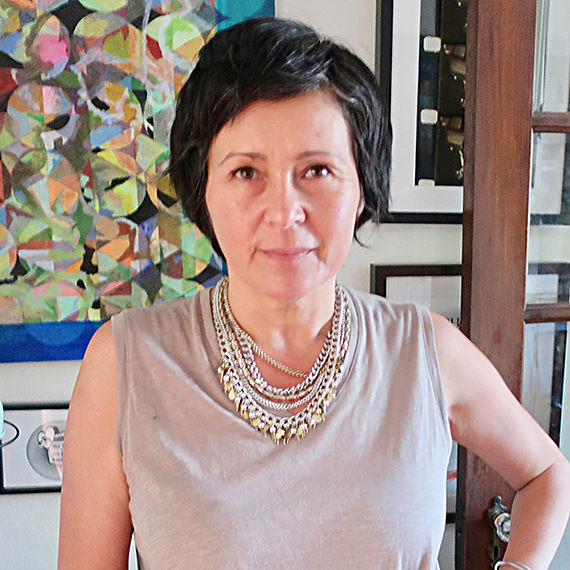
In Minor Feelings, Cathy Park Hong recounts meeting the poet Hoa Nguyen and being asked: “Tell me about your mother… You have an Asian mother. She has to be interesting.” Hong uses this memory to justify why she cannot write about her mother just yet: “My mother would take over, breaching the walls of these essays, until it is only her.” But Hoa Nguyen’s fifth collection A Thousand Times You Lose Your Treasure is this monument to her mother. This project, Nguyen admits, has been in the making for more than a decade because it has always seemed an impossible one: “It’s not going to be done—because I am not actually sure that I did it.”
These poems do not aim to present a full portrait of her mother Nguyễn Anh Diệp / Linda Diệp Lijewski, even less to narrate her life after she had passed away in 2019. In an interview, Nguyen remembers how her friends at school did not believe that her mother was part of the all-female stunt troupe because it did not conform to popular images of what Asian and Asian American women could be. A Thousand Times therefore fixates its attention upon this immigrant mother before she had become an immigrant mother, before “old skins shed / as a Silver Snake (1941) / sweet toddler on the / crook of her hip” (“Dang You Then a Dang”). Rather, Diệp is celebrated through Nguyen’s terse and vigorous lines as “Silver snake / somewhere-bound” (“Ask About Language As If It Forgets”), “Delta girl plotting a runaway plot / No waiting-in-shadows life for us” (“Autonomous Song”), and the one who “took a taste of earth / held hands on the Wall of Death” (“Tryouts for the Flying Motorist Artist Term, 1958”). The collection embraces the very incompleteness of its memories and its status as a poetic memorial. Nguyen dismisses the question of her mother’s faults with a bold one-line poem titled “Hagiography”: “A saint she ain’t.” The collection’s purpose—and indeed, the presence of Nguyen’s mother makes this collection feel more purpose-driven than preceding volumes, as the multitudinous perspectives of each poem accumulate into a wondrous sprawl—is to nourish the reader with tales of Diệp’s daring as a young woman and flying motorcycle artist before having left Vietnam.
The spirit of Theresa Hak Kyung Cha’s field-defining Dictee animates Nguyen’s collection, not only because both are mythopoetics in honor of the refugee mother, but also because one can detect Cha’s avant-garde style in Nguyen: the incantatory lines, the dream-like Sapphic fragments, the insertion of found photographs, the ludic translation exercises. Nguyen’s poems, at bottom, are most like Cha’s in the way English becomes morphed by a non-native tongue, how each word is heavy like gravel, and each line rattling resolutely like a bike chain. The speaker is suspended in these fraught but fertile relationships to Vietnamese as a lost tongue and English as the colonizer’s tongue:
myth and history twist
exile into a tower structure
also called “mouth”
that feeling of headlong
the site of mother
my longing in language
(“Failed Tower Ca Dao”)
In her desire to reconnect with the Vietnamese sources of Ca Dao, or folk poetry, Nguyen recognizes how this “failed tower” has come to propel her own poetry. Divination is cardinal to Nguyen’s writing practice, and the tarot card of the Tower functions as an animating image not only here but throughout the collection. The Tower is the crumbling phallic structure which must give way to not only a feminine poetics of absence and non-linearity, but also the fate of Babel through which language is irreversibly dispersed. In an interview, Nguyen states, “Often I think I write poems toward… the loss of my first language, Vietnamese—that that language displacement informs the cadence of sound I seek.” The poem “Failed Tower Ca Dao” fittingly ends by leaving itself open to ghostly reverie: “absurd longing to sing the sun / to exist and live an island of”. If poetry is that which occurs in the wake of catastrophe, then it is a matter of both rebuilding and of dwelling in silence.

Nguyen’s attitude toward poetry as an inheritance, a call-and-response, and a chorus of many is reflective of her larger attitude toward language as a communal practice. [The reader might be pleased to catch the mutual citations between her and Ocean Vuong: “washed out washington dc stars / night sky exit window to low roof” (“Warm Rain”)]. In this sense, Nguyen’s own writing style is a continuation of her mother’s nerve and defiance as a free-wheeling performer. Diệp’s commanding personality, of course, preceded her career as a motorcycle artist:
She read the taboo novels
named daughters
for tragic rewritten heroines
trodden oceanic sorrow
She will ride ruffian
(“Ask About Language As If It Forgets”)
The poems tell of how Diệp had to educate herself in a Vietnamese society which refused to educate women, and to speak for herself in an America which would not notice its immigrants and refugees. But obstacles are sometimes overcome, and even loss can become a gain of sorts: “Lose the word lose / in its original shape” (“We Run On Trash Grass”).
Throughout the collection, Nguyen grapples with all she does not know of her mother land, her mother tongue, and her mother. Her poetry materializes from yet gravitates toward these absences—a movement which Nguyen describes as “circling the distance.” The result are portraits of Diệp which are at once detached but loving, legendary but also whimsical. In order to honor her mother as more than her mother, as a figure who has endured the travails of war and history, Nguyen situates Diệp within the vast and hostile landscape of Vietnam during the 1950’s and 60’s by innovating upon a breadth of poetic forms: letters, song lyrics, news clippings, magazine adverts, military reports, ghost stories, cultural instruction guides, language textbooks, and transcripts of US psychological warfare tapes. Even in her odes to her mother’s bike stunts, youth, and romances, the collection refuses to take its eyes away from the decades of incendiary and chemical devastation wreaked upon Vietnam. A Thousand Times You Lose Your Treasure resists the devices of narration, but still accomplishes everything which narrative aspires toward. Nguyen astounds by showing what poetry can do when a portrait converges with an archive, as her reader comes to understand the fullness and historical weight of a single life. In the last lines of the last poem, Nguyen sings: “our tears mix with tears / I have no sacred rites for you / saving the sacred / grove you grew” [“Sings the Wishing Well (The Ghost Well Cared-For)”].
A Thousand Times You Lose Your Treasure
by Hoa Nguyen
Wave Books, $18.00
Contributor’s Bio
Sydney To is an English PhD candidate at UC Berkeley, with research interests in Asian American literature, transpacific Vietnamese literature, critical refugee studies, and biopolitics. His work has appeared in Asian American Literature: An Encyclopedia for Studies and Asian Review of Books.


